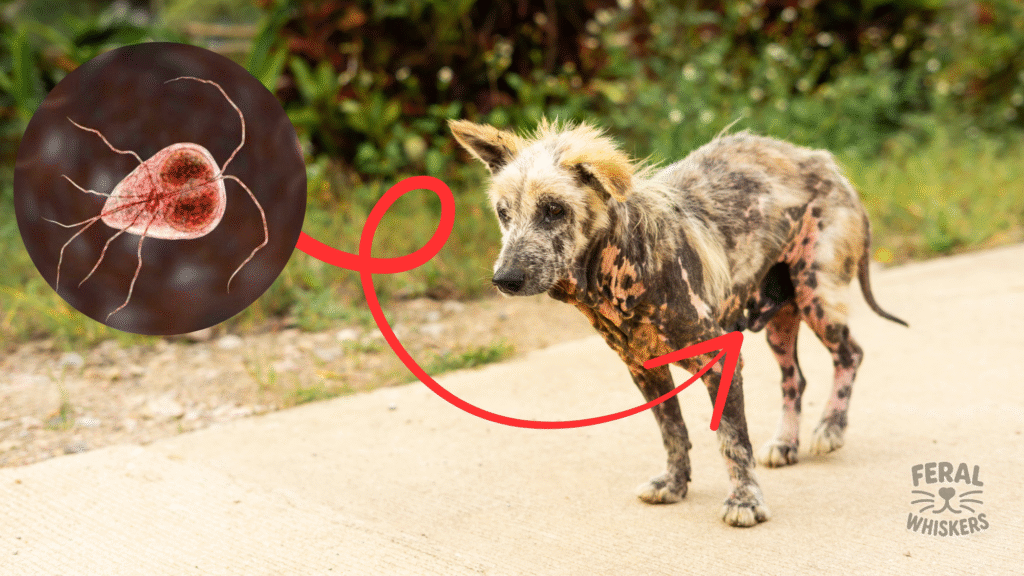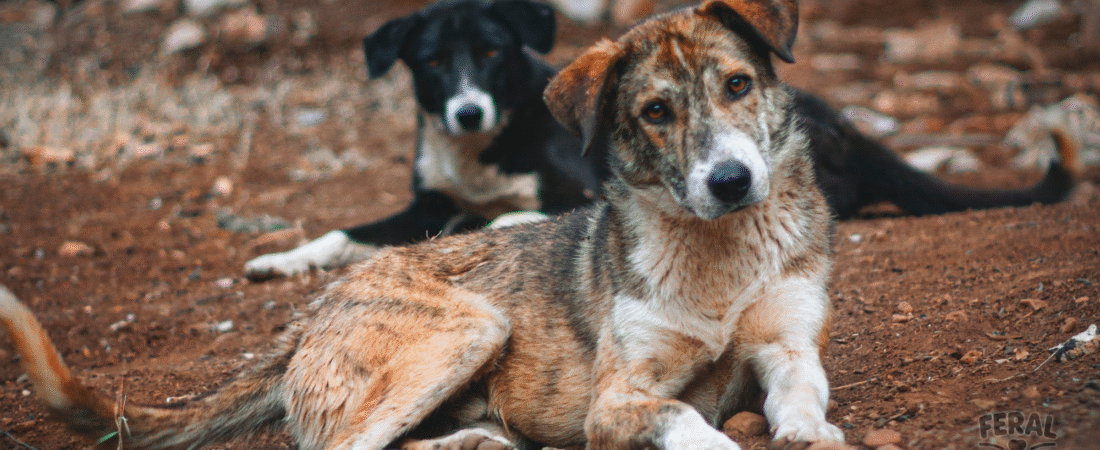📌 Why This Matters

Few things worry fur parents more than their dog suddenly having smelly, watery diarrhea — especially in a puppy. Two of the most common culprits are Giardia and Coccidia.
These parasites are:
- Microscopic organisms (protozoa), not worms 🦠
- Very contagious between dogs
- Often picked up from contaminated water, soil, or poop
- Treatable and preventable — but can become serious if ignored
This guide makes it easy to understand:
✅ What Giardia and Coccidia are
✅ Symptoms to watch for
✅ How vets diagnose and treat them
✅ How to prevent reinfection
✅ Holistic and budget-friendly support
1. Meet the Culprits
🦠 Giardia
- A protozoan parasite that lives in the intestines.
- Dogs get it by drinking contaminated puddles, lakes, streams, or shared water bowls.
- Zoonotic potential: humans can catch Giardia, though usually from contaminated water (rarely from dogs with good hygiene).
🦠 Coccidia (Isospora, Cystoisospora)
- Another tiny protozoan that lives in the intestinal lining.
- Common in puppies, especially in shelters, kennels, or breeders.
- Spread by swallowing oocysts (eggs) in contaminated poop.
- Not typically zoonotic (different species infect people).
2. How Dogs Get Infected
- Licking or eating contaminated soil or grass 🌱
- Drinking from dirty puddles, ponds, or unwashed bowls 💧
- Sniffing or eating poop from other dogs (dog parks, kennels) 💩
- Stress + weakened immune system = puppies and sick dogs more likely to get sick
3. Symptoms to Watch Out For
Both Giardia and Coccidia cause digestive upset, but each has clues:
Giardia Signs:
- Foul-smelling, greasy diarrhea (sometimes greenish)
- Weight loss despite eating
- Intermittent symptoms: diarrhea one day, normal poop the next
- Dehydration if diarrhea lasts several days
Coccidia Signs:
- Watery diarrhea, sometimes bloody or mucusy
- More common in puppies
- Severe cases → dehydration, vomiting, weight loss
- Weakness, stunted growth in young dogs
⚠️ Severe diarrhea, dehydration, or blood in stool = Vet visit needed ASAP, especially for puppies.
4. How Vets Diagnose
4.1 Fecal Testing
- Fecal flotation and microscopy: Looks for cysts (Giardia) or oocysts (Coccidia).
- Giardia snap test (ELISA): Detects Giardia proteins for faster, more accurate results.
4.2 Repeated Samples
Giardia often sheds eggs on and off → a single test can miss it. Vets may ask for 3 fecal samples over several days.
5. Vet-Recommended Treatment
Giardia
- Metronidazole: Common first-line antibiotic/antiparasitic, but resistance is rising.
- Fenbendazole (Panacur): Dewormer that’s very safe and effective against Giardia.
- ✅ Often, vets use both together for stubborn cases.
Coccidia
- Sulfa drugs (sulfadimethoxine/Albon®): Most common treatment.
- Toltrazuril or Ponazuril: Used in some regions, highly effective especially in shelters/kennels.
Supportive Care
- Probiotics during and after treatment.
- Fluids + electrolyte support for puppies with dehydration.
6. Prevention (The Real Key — Because Reinfection Is Common)
- 🚽 Pick up poop immediately: Stop parasites from spreading in soil.
- 🧼 Disinfect areas: Use diluted bleach (Giardia cysts are resistant to many disinfectants, but 1:32 bleach-water works on hard surfaces).
- 🛁 Bathe your dog after treatment: Giardia cysts can stick to fur — reinfection risk.
- 💧 Fresh, clean water only: No puddles, no dirty bowls.
- 🐶 Regular fecal tests at the vet (once or twice a year).
7. Holistic & Budget-Friendly Care
⚠️ These parasites need medical treatment for full clearance — but natural/home care helps prevention, recovery, and immune strength.
7.1 Diet & Gut Health
- Pumpkin Puree 🎃: Helps firm up stools and soothe intestines.
- Probiotics / Yogurt / Kefir 🥛: Restore balance after diarrhea or antibiotics.
- Bone Broth 🍲: Gentle, hydrating, provides electrolytes.
- Slippery Elm Bark 🌿: Natural gut soother; coats intestines and helps with diarrhea.
7.2 Natural Prevention Aids
- Apple Cider Vinegar (ACV): Small amounts in water may discourage Giardia survival (not a cure, more supportive).
- Coconut Oil: Antimicrobial properties; small daily spoon mixed in food.
- Garlic (microsized dosing, vet-guided): May reduce intestinal parasites’ strength.
7.3 Environment & Budget Hacks
- Bleach Mop Floors: 1:32 bleach solution, weekly.
- White Vinegar Rinse: Kennel floors, washable toys, bowls.
- Sunlight Exposure 🌞: UV dries out and kills parasite cysts. Lay bedding and toys outside when possible.
8. Step-by-Step Plan for Fur Parents
If Your Dog Has Giardia or Coccidia:
- 🩺 Go to the vet, get fecal tested, and follow treatment.
- 🐾 Bathe your dog on treatment start and repeat after finishing.
- 🧼 Clean bedding, bowls, floors EVERY day during treatment.
- 🚫 Stop dog park visits until vet confirms parasite-free.
- 🥛 Give probiotics and pumpkin for gut recovery.
If You Can’t Afford a Vet Immediately:
- 🚨 Do your best to keep your dog well hydrated (chicken broth, water) while you save for care.
- 🥕 Feed bland diet (boiled chicken, white rice, pumpkin).
- 🧼 Clean every stool immediately.
- 🛁 Bathe daily to avoid reinfection.
- ⚠️ Still try to bring stool sample to a low-cost vet clinic or shelter ASAP — home care cannot cure Giardia/Coccidia.
9. FAQs
Q1: Can I get Giardia or Coccidia from my dog?
- Giardia: Rare, but possible if hygiene is poor. Wash hands!
- Coccidia: No, the species in dogs don’t infect humans.
Q2: My dog keeps getting Giardia again — why?
- Reinfection from the environment! Must disinfect home/yard + bathe dog.
Q3: My dog has diarrhea but tested negative — what now?
- Giardia sheds off/on. Ask for repeat testing or ELISA. Other causes (worms, diet, stress) may be involved.
Q4: Can diet alone cure Giardia or Coccidia?
- No. These need prescription meds. Food helps manage diarrhea & recovery only.
Q5: How long till my dog feels better?
- Usually improvement within 3-5 days of meds. Full clearance may take 7-21 days.
10. Common Fur Parent Concerns
| Concern | Simple Answer |
|---|---|
| “My puppy has diarrhea, maybe just food change?” | If watery, smelly, or with blood → Vet check. Parasites are very common in puppies. |
| “Giardia keeps coming back even after meds!” | Likely reinfection from fur, toys, yard. Must deep clean environment and bathe dog. |
| “Poop looks normal but dog tested positive — should I treat?” | Yes! Parasites can be asymptomatic but still cause damage and spread to other animals. |
| “Natural herbs can cure Giardia, right?” | No strong evidence. Herbs help gut healing but don’t kill parasites. Always pair with vet meds. |
✅ Final Takeaway
Giardia and Coccidia are tiny but mighty parasites that love to wreak havoc on your dog’s belly. While diarrhea is their main calling card, the real danger is dehydration and long-term gut damage if untreated.
💡 The Gold Standard: Vet testing + targeted meds.
💡 At-Home Support: Probiotics, pumpkin, hydration, household disinfection.
💡 Budget Tip: Daily cleaning + prevention makes reinfection less likely (saves cost later).
With awareness, consistency, and a mix of medical care + holistic support, your pup can recover quickly and enjoy parasite-free playtime again!

